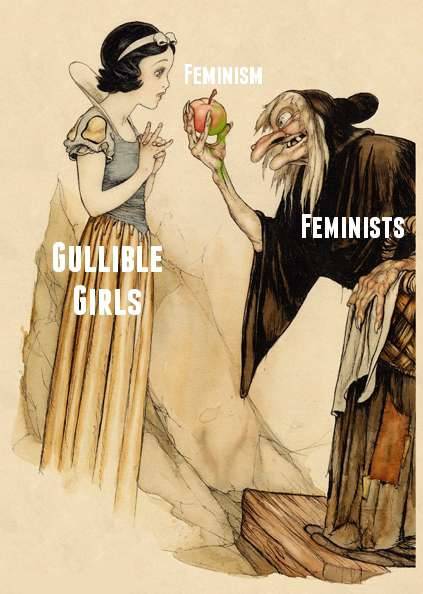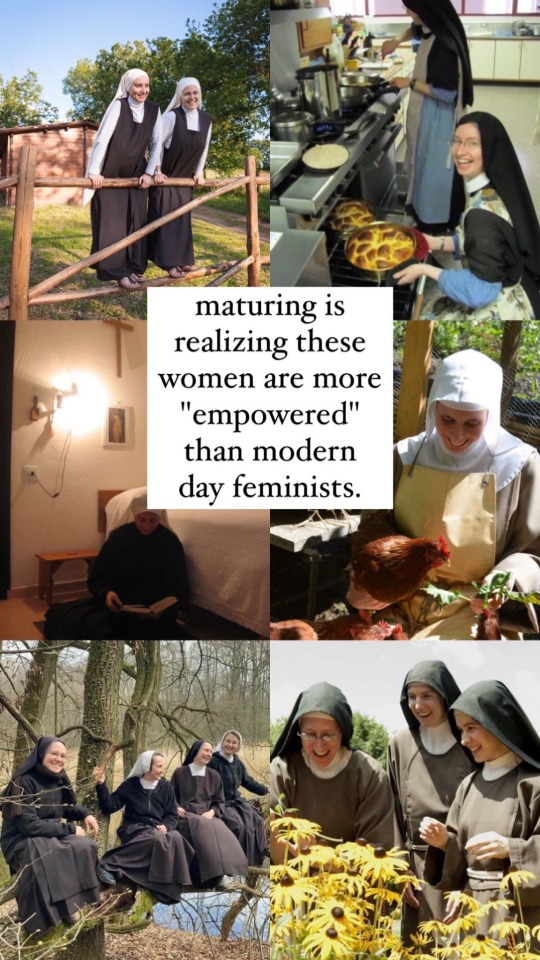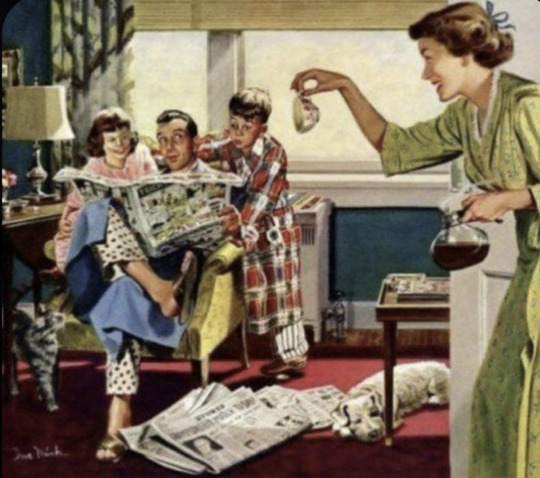#antifeminism
Text
it's worse than that though cuz some of you make it really obvious that you think the bad part about terfs/radfems is the (lip service to) "feminism" part
like some of you do claim to be feminists but you think it's really important that any feminist discussion center men's perspectives and priorities and you're calling trans women terfs for explaining basic feminism 101 shit like "patriarchy is designed to benefit men at the expense of women" and you're constantly saying transmisogynistic shit about how trans women are perverts or that they're all trying to pressure people into being trans and you literally sound like terfs yourselves half the time except you're a little more honest about the fact that you think feminism is unfair to men
like i really don't think it's the transmisogyny some of you dislike 🤔
#pathetic#transmisogyny#antifeminism#kinda done with people regurgitating antifeminist talking points and jumping on any trans women kind enough to patiently explain#huge parts of this site have grown brainworms in the last couple years#thatdiabolicalfeminist
915 notes
·
View notes
Text
it's still shocking how unbelievably ignorant antifeminists (MRAs, TRAs, etc) are about what radical feminism even is. they'll say, without a SHRED of irony, shit like "radical feminists are evil because they want to force you to be a conservative christian barefoot housewife!!" are you SMOKING CRACK? THINK about the words you're saying and ask if that makes any fucking sense! even if you don't understand what the word 'radical' means, the word 'feminist' should be familiar enough that you instinctively know that feminists are not conservative and do not want women to be restricted to that!
but thanks to YEARS AND YEARS of constant slander, the average antifeminist thinks they know everything about feminism despite not knowing a fucking thing. it's an overload of disinformation, to the point where there are grown adults who think it's fascist to fund a homeless shelter specifically for women. there are grown adults who think "no means no" is a human rights violation. there are grown adults who think women do not have any disadvantage in a physical fight against a man.
that's not even touching how much worse it is for kids and teenagers, who understandably have less life experience but are then being told lie after lie by corporations trying to sell them eternal youth and the perfect body they'll never have. it's exhausting. it's fucking endless and exhausting.
361 notes
·
View notes
Text
When antifeminist women succeed under patriarchy, they use it as proof that feminism is worthless.
When antifeminist women suffer under patriarchy, they use it as proof that feminism is worthless.
When an antifeminist woman has a successful career, particularly an intellectual career or in a male dominant field, she assumes she got there on her own talents alone and sees feminism as irrelevant. She will either believe any woman could do this if they simply worked hard enough (without a “feminist victim mindset” talking about barriers of course) or she will believe that she has exceptional abilities.
When an antifeminist woman suffers under patriarchy, she does not blame the men who abused her. She blames feminism for not protecting her. When she sees men degrade her, she says “Why do feminists hate women like me?” even while herself trampling over other women’s rights.
549 notes
·
View notes
Text

126 notes
·
View notes
Text
Get "power" by "surrendering" and "submitting" to your man's every whim, a leading '80s self-help manual advises in typical feminist-sounding rhetoric. Don't talk back, because a ladylike silence will "enhance" your "self-respect" and "feeling of mastery." "Take charge . . . of your courtship," suggests another popular text. "Overcome obstacles," so you can get married. The pseudofeminist title of one 1989 advice book puts it most succinctly: Women Who Marry Down and End Up Having It All.
While the backlash therapy books may be written in feminist ink, they blot out the most basic precept of feminist therapy—that both social and personal growth are important, necessary, and mutually reinforcing. This is a view that was supported, albeit in a rather degraded, commercialized form, in the leading self-help manuals of the 70s; in 1975, The New Assertive Woman issued an "Everywoman's Bill Of Rights" that called for "the right to be treated with respect" and "the right to be listened to and taken seriously." The '80s advice writers, by contrast, seemed to go out of their way to urge women to stop challenging social constraints and to keep their thoughts to themselves—to learn to fit the mold rather than break it.
On no group of women did the self-help authors impress this message more strongly than the ones without wedding rings. The diagnosis was, underneath it all, little changed from the postwar era, when that era's leading advice book—Marynia Farnham and Ferdinand Lundberg's Modern Women: The Lost Sex—declared all single women neurotics and proposed subsidized psychotherapy to get them married. In the '80s, even advice experts more sympathetic to single women and the pressures they faced touted the same marital party line. In the popular 1988 advice book, If I'm So Wonderful, Why Am I Still Single?, counselor Susan Page acknowledges in her introduction that unwed women are contending with a social climate that is especially rough on them now; they are burdened by "the specific problems that our times have spawned, such as misogyny," she writes. But she's not interested in helping single women develop the self-confidence and internal strength they need to bear up under these antagonistic conditions. Nor does she propose that single women even question the culture's marital marching orders. "I want to accept certain sociological and psychological factors as given [her emphasis]," she writes. "In this book we will not discuss why [her emphasis] these conditions are as they are, and we will not lament them." What then should single women do to ease what Page calls the "Great Emotional Depression" that she says has descended on millions of them? Just change your single status, she proposes. She dispenses "strategies" only to make women more marketable for marriage.
The '80s backlash therapists firmly rejected another fundamental feminist principle—that men can, and should, change, too. "[L]ately it seems there is a rising tide of utter frustration among women concerning men," Smart Women/Foolish Choices observes, and a lot of women "always end up feeling disappointed by men." But Cowan and Kinder do not go on to consider what men might be doing to inspire such an outpouring of frustration, nor how men might change their behavior to make women feel better. Instead, the psychologists conclude that men are fine and any disappointment women feel is wholly self-generated. It's not the men who are "inadequate," the authors write; it's just that the women's "expectations are distorted." Women are just "hypercritical" of men. All would be well if women only learned to "truly understand men" and their "need for mastery and career success." Women would be happy if they only quit "pushing" the opposite sex to change and learned to "compromise."
Asked later what sort of compromises he had in mind, Kinder says: "Women could have their kids while they are still in college, and then, if they still want a career, they can do that after the kids are grown. You do have to make some sacrifices." What about fathers "sacrificing" by taking some responsibility for their children? Kinder, whose wife stayed at home to raise their children, mulls it over. "Yeah, well that would solve the problem," he says. "But men won't do it. And it's not our place to be saying things like that. We're not social engineers." Not, anyway, when it comes to men.
Confronted with the antifeminist implications of their message, the backlash therapists almost always issue a denial. "We're talking about broadening expectations, not settling for less, and that's not just a play on words," Cowan says. But it is exactly that—unless Cowan has already forgotten his own "Rules for Finding the Right Man" in Smart Women. Rule #8: "Fewer expectations lead to greater aliveness."
Some of the therapists attacking women's liberation most forcefully claimed, in fact, to be proponents themselves. As many media-conscious therapists in the '80s discovered, feminist-bashing "feminists" garnered the most airtime. Susan and Stephen Price, authors of the popular No More Lonely Nights: Overcoming the Hidden Fears That Keep You from Getting Married, were one such "feminist" husband-and-wife therapy team who got a lot of press mileage plugging this backlash diagnosis of modern single women: "androphobia." This "problem without a name," they wrote, shamelessly stealing Friedan's phrase, was a "deep-rooted intense fear of men" shared by most unmarried women over thirty, especially professional women. The cause: "You have been deeply influenced by feminism."
* * *
"These obsessive androphobic fears are a major ingredient in women's resistance to marriage today," Stephen Price is saying in his Manhattan office, a few weeks after his appearance on the "Today" show. "Now that we've reached the end of the women's movement, which is where our culture is today . . ." Here he hesitates, then says, "We both, of course, feel very pro the gains of the women's movement."
His wife, Susan, seated in the office's other therapeutic armchair, nods vigorously. "We're both feminists," she says. "In fact, it was almost me being a feminist that kept me from seeing these hidden fears developing. As a therapist I encouraged women to pursue careers. But what happened is, women escaped into their careers and they didn't put their energy into their relationships. Their feminist viewpoint became a trap." But if careers hurt women psychologically, then why do professional women consistently rank highest, as we've seen, in virtually all measures of mental health? The Prices have no answer.
In spite of their pro-feminist claims, the Prices seem to oppose every feminist tenet, from economic independence to sexual freedom. In their book and in their counseling sessions, they advise women to refrain not only from initiating sex but from having sex at all before marriage. "If the woman is sexually aggressive, the man might put her in the category of someone to go to bed with, period," Susan Price says. Evidence? "Fatal Attraction may be overdrawn in some ways, but you can really see that operating there," she says.
Unlike authentically feminist therapists, the Prices don't consider, much less confront, other forces at work in women's lives. They reinforce the era's isolation of single women by encouraging their female readers to see themselves as defective units, alone and isolated only by their own aberrant behavior. They advise women to "deal with your own personal crisis: What might you [their emphasis] be doing to make intimacy with a man impossible? What attitudes are keeping you [their emphasis] unavailable for marriage?" The primary offending attitude that the book singles out: an insistence on respect and equal treatment from one's mate. "The desire to avoid a submissive status in relationship to men can lead you into a loveless life," they assert. Again, there is no analysis of the attitudes of men, much less proposals for altering them. If a man mistreats a woman, she probably asked for it. "A resistant woman picks a resistant man," Susan Price says. "What we help single women to see is how what they think is a problem with the man is really something inside them." Don't men play any role in difficult relationships? "Probably it is a fifty-fifty proposition," Stephen Price concedes, shrugging. "But this book is focused on women—for the purpose of clarity."
While they don't actually support a feminist vision, the Prices are happy to appropriate the movement's activist language to promote their own agenda. They urge women to "take control" of their love lives by scaling back their career aspirations and to "gain power" over potential husbands by remaining celibate. "It's Up to You to Get Married," the manual instructs, this being the only arena, apparently, in which it's okay for women to take the initiative.
Androphobia may have a scientific ring, but it's not based on scientific research—or any research at all. "We just knew it was a phobia," Stephen Price says flatly. How? "Well, because there's an avoidance there." Pressed to explain what that means, Stephen Price falls silent. Finally, he says: "A lot of the dynamics of phobia are hidden. That's how we know it's a phobia. It's very hidden." This invisible phobia turned the Prices into very visible "marriage gurus," as they now call themselves. "We are inundated," Susan Price says happily. "We've been doing three radio shows a week. Women are calling up saying, what's your [marriage] success rate? We do sessions by phone. We have women flying in from out west. And we get so many letters from women saying they read our book and they realize now how they did it to themselves. They are grateful."
It turns out that Susan Price does actually support feminist principles in one way—for herself. "When we first married, Steve couldn't understand my need for my own career and not wanting to be a homemaker," she recalls. "I got jobs [to support him] while he was in graduate school. He was being groomed for a career and what was I doing?" First she became a schoolteacher, but she didn't find it fulfilling enough. "I decided I wanted to be a therapist. So I went back to graduate school. The kids were still babies at the time. We hired a lot of baby-sitters and put them in a lot of nursery schools." Was any of this a mistake? "Oh, no. I love what I do."
-Susan Faludi, Backlash: the Undeclared War Against American Women
#susan faludi#marriage#self help#antifeminism#female oppression#male entitlement#the more things change the more they stay the same
120 notes
·
View notes
Text
"It takes a brave man to face a brave woman, and man's fear of woman's creative energy has never found an expression more clear than in the old German clamor, renewed by the Nazis, of "Kinder, Küche, Kirche" for women."
-- Pearl S. Buck
"Kinder, Küche, Kirche, or the 3 Ks, is a German slogan translated as "children, kitchen, church" used under the German Empire to describe a woman's role in society. It now has a mostly derogatory connotation, describing what is seen as an antiquated female role model in contemporary Western society."
"In a September 1934 speech to the National Socialist Women's Organization, Hitler argued that for the German woman her "world is her husband, her family, her children, and her home", a policy which was reinforced by the stress on "Kinder" and "Küche" in propaganda, and the bestowing of the Cross of Honor of the German Mother on women bearing four or more babies."
https://en.wikipedia.org/wiki/Kinder,_K%C3%BCche,_Kirche
40 notes
·
View notes
Text

401 notes
·
View notes
Text
4B (or "Four No's") is a radical feminist movement originating in South Korea in 2019.[1][2] Its members renounce four activities:
sex (Korean: 비섹스; Hanja: 非sex; RR: bisekseu),
child-rearing (Korean: 비출산; Hanja: 非出産; RR: bichulsan),
dating (Korean: 비연애; Hanja: 非戀愛; RR: biyeonae), and
marriage with men (Korean: 비혼; Hanja: 非婚; RR: bihon).[1][3]
This is the sort of thing I see from feminists, and this is why I say it is a suicide cult.
Without children, how do you get more Feminists? The people who hate you are having kids like mad.
The huge population growth from the most extreme Islamists in the world - those who genuinely unironically have a rape culture and a Patriarchy - will inevitably replace a Feminist culture, because Feminists choose to sabotage reproduction.
Without new humans, any Feminist culture is automatically doomed. And they cannot convert Islamists - if anything, Feminists don hijab and fall on their knees at the sight of a violent and patriarchal man.

I suspect it's a kink for them.

19 notes
·
View notes
Text
Only a TERF could think that "pregnant person" and "woman" are synonyms.
#TERFism#radblr#terfblr#radical feminism#radfem#gender critical#feminism#antifeminism#gender essentialism#tradfem#tradwife#gender roles#traditional femininity#traditional gender roles#misogyny
380 notes
·
View notes
Text

#antifeminism#antifeminist#conservative#empowerment#ex feminist#ex radfem#feminism#feminism discourse#feminist#liberal#mine#nuns#peace of mind#philosophy#politics#religion#thoughts#values#women#women's rights
51 notes
·
View notes
Text

Kanye on his way to meet with Trump with White Nationalist Nick Fuentes in tow. Apparently the two met through Milo Yiannopoulos.
#kanye west#nick fuentes#milo yiannopoulos#white nationalist#white nationalisms#white supremacy#white supremacist#racism#antisemitism#antifeminism#facism
207 notes
·
View notes
Text

Nothing more nothing less, the way people use the female identity as a costume they can put on and take off is off putting to say the least. Women don’t feel ashamed to say this!
#tradwife#traditional wife#christian femininity#antifeminism#traditional femininity#christianity#tradlife#anti trans activism#anti transgender
434 notes
·
View notes
Text
But what exactly is it about women's equality that even its slightest shadow threatens to erase male identity? What is it about the way we frame manhood that, even today, it still depends so on "feminine" dependence for its survival? A little-noted finding by the Yankelovich Monitor survey, a large nationwide poll that has tracked social attitudes for the last two decades, takes us a good way toward a possible answer. For twenty years, the Monitor's pollsters have asked its subjects to define masculinity. And for twenty years, the leading definition, ahead by a huge margin, has never changed. It isn't being a leader, athlete, lothario, decision maker, or even just being "born male." It is simply this: being a "good provider for his family."
If establishing masculinity depends most of all on succeeding as the prime breadwinner, then it is hard to imagine a force more directly threatening to fragile American manhood than the feminist drive for economic equality. And if supporting a family epitomizes what it means to be a man, then it is little wonder that the backlash erupted when it did—against the backdrop of the '80s economy. In this period, the "traditional" man's real wages shrank dramatically (a 22 percent free-fall in households where white men were the sole breadwinners), and the traditional male breadwinner himself became an endangered species (representing less than 8 percent of all households). That the ruling definition of masculinity remains so economically based helps to explain, too, why the backlash has been voiced most bitterly by two groups of men: blue-collar workers, devastated by the shift to a service economy, and younger baby boomers, denied the comparative riches their fathers and elder brothers enjoyed. The '80s was the decade in which plant closings put blue-collar men out of work by the millions, and only 60 percent found new jobs—about half at lower pay. It was a time when, of all men losing earning power, younger baby-boom men were losing the most. The average man under thirty was earning 25 to 30 percent less than his counterpart in the early '70s. Worst off was the average young man with only a high-school education: he was making only $18,000, half the earnings of his counterpart a decade earlier. Inevitably, these losses in earning power would breed other losses. As pollster Louis Harris observed, economic polarization spawned the most dramatic attitudinal change recorded in the last decade and a half: a spectacular doubling in the proportion of Americans who describe themselves as feeling "powerless."
When analysts at Yankelovich reviewed the Monitor survey's annual attitudinal data in 1986, they had to create a new category to describe a large segment of the population that had suddenly emerged, espousing a distinct set of values. This segment, now representing a remarkable one-fifth of the study's national sample, was dominated by young men, median age thirty-three, disproportionately single, who were slipping down the income ladder—and furious about it. They were the younger, poorer brothers of the baby boom, the ones who weren't so celebrated in '80s media and advertising tributes to that generation. The Yankelovich report assigned the angry young men the euphemistic label of "the Contenders."
The men who belonged to this group had one other distinguishing trait: they feared and reviled feminism. "It's these downscale men, the ones who can't earn as much as their fathers, who we find are the most threatened by the women's movement." Susan Hayward, senior vice president at Yankelovich, observes. "They represent 20 percent of the population that cannot handle the changes in women's roles. They were not well employed, they were the first ones laid off, they had no savings and not very much in the way of prospects for the future." Other surveys would reinforce this observation. By the late '80s, the American Male Opinion Index found that the largest of its seven demographic groups was now the "Change Resisters," a 24 percent segment of the population that was disproportionately underemployed, "resentful," convinced that they were "being left behind" by a changing society, and most hostile to feminism.
To single out these men alone for blame, however, would be unfair. The backlash's public agenda has been framed and promoted by men of far more affluence and influence than the Contenders, men at the helm in the media, business, and politics. Poorer or less-educated men have not so much been the creators of the antifeminist thesis as its receptors. Most vulnerable to its message, they have picked up and played back the backlash at distortingly high volume. The Contenders have dominated the ranks of the militant wing of the '80s antiabortion movement, the list of plaintiffs filing reverse-discrimination and "men's rights" lawsuits, the steadily mounting police rolls of rapists and sexual assailants.
-Susan Faludi, Backlash: the Undeclared War Against American Women
54 notes
·
View notes
Text
traditional gender roles are beautiful. they are the epitome of male and female teamwork; the thin line between structure and chaos. 🌸

#1950s housewife#traditional gender roles#traditional femininity#traditional masculinity#housewife#patriarchy#anti feminist and proud#antifeminism
154 notes
·
View notes
Text
"Whereas the antifeminism of men comes from the oppression they exert, the antifeminism of women comes from the oppression we suffer. In no way can feminists see antifeminist men and antifeminist women as the same, nor can they call the latter their enemies. Antifeminist women are not separated from us by objective interests but by false consciousness. Furthermore false consciousness does not really separate us because we have all had it, and we all still have at least some of it. it is our common enemy. When we are struggling against their 'opinions', we are not struggling against antifeminist women but against this common enemy - and thus for them, and for ourselves." - Christine Delphy, Our friends and ourselves: the hidden foundation of various pseudo-feminist accounts
246 notes
·
View notes
Text

#family#values#western#tradwife#community#housewife#traditional marriage#antifeminism#feminism#beautiful
57 notes
·
View notes